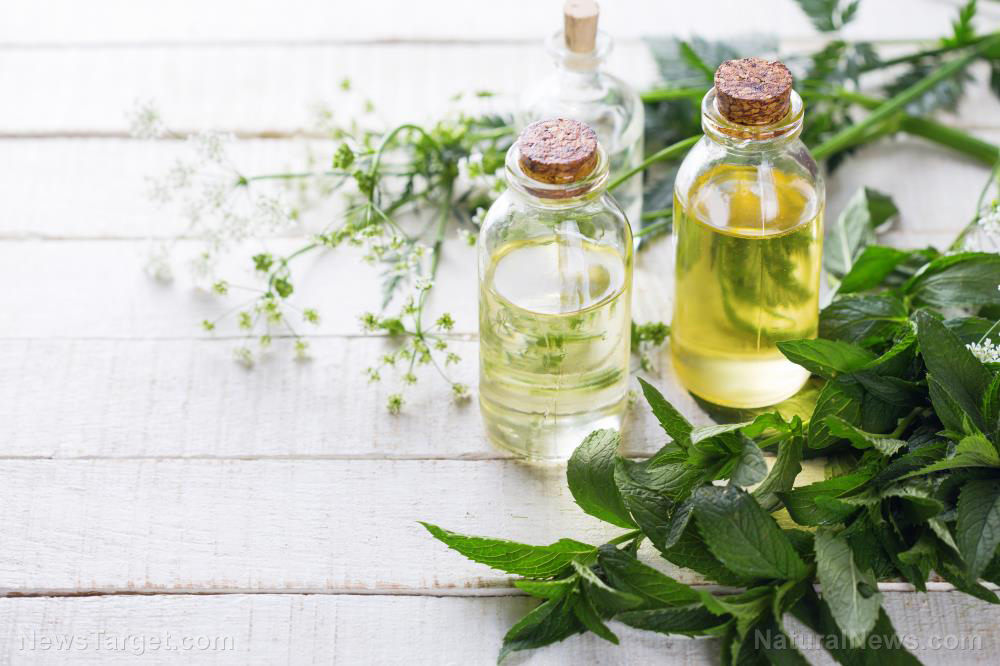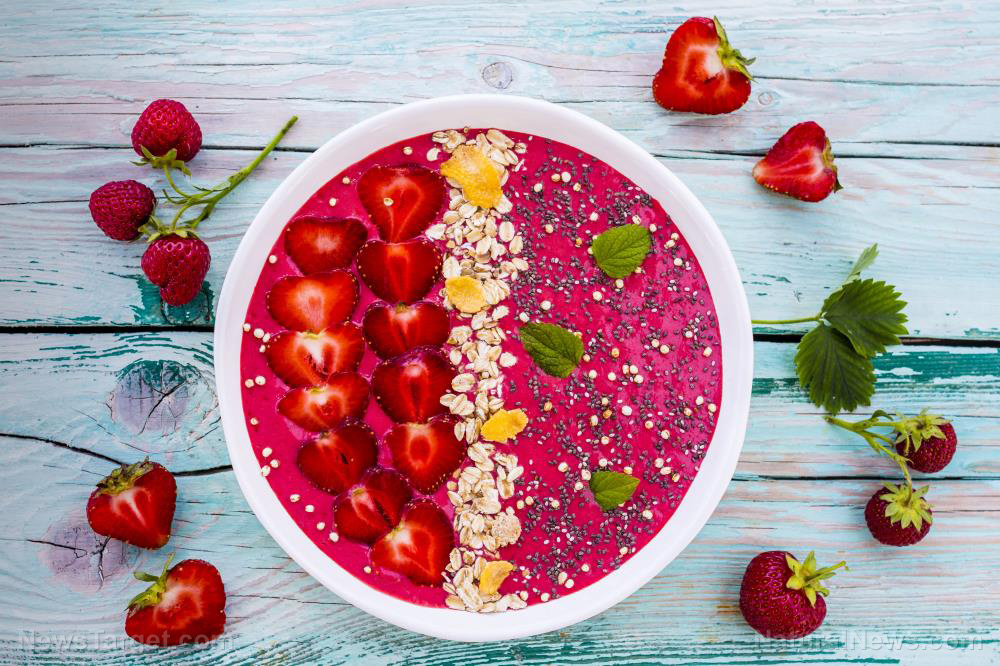Essential oils: Must-have items from Mother Nature for your survival cache
06/22/2022 / By Olivia Cook

Discomforts and illnesses don’t fail to show up during emergencies, disasters and survival scenarios. Stockpiling food, water and other necessities may not be enough to stay healthy during such times.
A careful selection of essential oils can be your best ally when you are in a situation with limited or absolutely no access to medical care. Learning about essential oils lessens your reliance on expensive, often ineffective and toxic pharmaceuticals.
Essential oils are the natural, aromatic liquids found in flowers, seeds, leaves, roots, trees, shrubs and bushes. Each oil extracted from various plants is made up of a variety of chemical constituents and has its own distinct chemistry. The distinctive elements in essential oils are important for plants to grow, live, protect them against insects and adapt to their surroundings.
A single drop of essential oil contains unique components (phytochemicals) that give it a distinct scent and bioactive elements that science has backed to naturally support vital functions of the human body, whether inhaled, taken orally or applied directly. (Related: The healing properties of essential oils.)
All you need is a couple of drops of essential oil at a time to enjoy its therapeutic effects and medicinal benefits for your health and well-being.
Essential oils you can add to your stockpile
Here is a list of essential oils for your survival kit, along with some of the science-backed health benefits associated with each of them.
Lavender
If you could have only a single essential oil with you, the multi-faceted lavender essential oil is always on top of the list of must-haves. The lavender essential oil is obtained from the fresh or partly dried leaves and flowers of Lavandula angustifolia by steam distillation, giving it a floral, fresh, sweet, herbaceous, sometimes slightly fruity and sometimes slightly camphorous fragrance.

A study published in Phytotherapy Research showed that the biological activities of phytochemicals and phenolic compounds found in lavender essential oil enable it to:
- Support immune system health
- Support respiratory health
- Support cardiovascular health
- Support nervous system health
- Support musculoskeletal health and wellness
- Support circulatory system health
- Support digestive system health
- Support urinary system health
- Support female reproductive system health
- Support skin health
- Support hair health
- Support healthy sleep cycles and sleeping patterns
- Naturally elevate mood
Phenolic compounds (mainly phenolic acids and flavonoids) as natural antioxidants in lavender essential oil support immunomodularity responses of the body to protect it against free radicals, which science associates with cell damage, illness and aging.
If inhaled, lavender essential oil lights up areas of the brain responsible for regulating emotional responses to ease stress, which affects all the musculoskeletal, respiratory, cardiovascular, endocrine, gastrointestinal, nervous and reproductive systems.
According to a study that appeared in the Journal of Cardiovascular Pharmacology, the lavender oil element called linalyl acetate relaxes vascular smooth muscle.
A study published in the Journal of Biological and Medical Rhythm Research showed the superior effects of essential oils like lavender in providing olfactory stimulus on sleep and mood. After being dosed with the scent of lavender essential oil during the night, both men and women participants reported feeling more vigor and improved quality of sleep.
Peppermint
Peppermint is cultivated for its essential oil obtained from freshly grounded leaves of the peppermint plant, Mentha x piperita L by distillation. It has a sharp odor and taste that is cool and refreshing. Peppermint oil can be applied topically, diffused in the form of essential oil, ingested orally in tablet or capsule form or applied intranasally (putting droplets inside the nose.) According to studies, peppermint oil can:
- Support immune system health
- Support digestive health
- Support cardiovascular health
- Support musculoskeletal health
- Support respiratory health
- Support healthy sleep cycles and sleeping patterns
- Support healthy cognitive functions
- Support oral health and hygiene
- Support healthy energy levels
- Support healthy skin
- Naturally elevate mood and energy
A study published in the Journal of Pharmacognosy and Phytochemistry highlighted many studies showing that peppermint oil and its extracts show a very strong barrier against the growth of harmful disease-causing microbes, such as Escherichia coli, Salmonella pullorum, Streptococcus faecalis, Lactobacillus bulgaricus and many others.
According to a study that appeared in Natural Product Communications, the active constituents of peppermint oil – menthol and menthone, cineole, limonene, beta-pinene and beta-caryophyllene – demonstrate strong antioxidant activity against the harmful effects of free radicals, as well as antispasmodic activity that helps relieve stomach cramps, bloating and farting, especially if you have irritable bowel syndrome (IBS).
Results of a study published in Avicenna Journal of Phytomedicine showed instant significant improvements in physiological parameters (blood pressure, heart rate, breath rate) and exercise performance (grip force, long and vertical jumps, visual and audio reaction times) after oral administration of peppermint essential oil.
A study that appeared in the Journal of International Oral Health cited peppermint essential oil as one of the essential oils used in dentistry for its therapeutic effects and medicinal properties. Peppermint essential oil supports oral health and hygiene by protecting people from oral pathogens and common bacteria.
Tea tree
Tea tree essential oil, sometimes called melaleuca oil, is an essential oil obtained by steam distillation from the leaves and terminal branches of the Melaleuca alternifolia. According to a study published in Clinical Microbiology Reviews, tea tree oil is composed of terpene hydrocarbons (mainly monoterpenes, sesquiterpenes and their associated alcohols), which have medicinal properties that:
- Support healthy immune functions
- Support respiratory system health
- Support digestive health
- Support hair, nails and skin health
- Support oral health and hygiene
For almost 100 years, aboriginal Australians crush tea leaves to extract the oil, then inhale it to treat coughs and colds.
A study published in Biomedicine & Pharmacotherapy highlights tea tree oil and its 15 major components (natural mono terpenes) that show good potential in treating parasitic infections (protozoan and helminth infections, among others).
According to the Dental Group of Amarillo, tea tree essential oil is a perfect ingredient for a DIY toothpaste or mouthwash because of its ability to kill off bacteria that cause bad breath, tooth decay and bleeding gums. Please note that tea tree essential oil should NOT be used for internal use other than a mouthwash or toothpaste that you spit out after use and rinse with water.
Tea tree essential oil contains hundreds of constituents, but two specific compounds give this essential oil its punch — terpinen-4-ol, which promotes healing and has a proven antimicrobial effect against fungal biofilms with its ability to inhibit the adhesion of periodontopathic and cariogenic bacteria like P. gingivalis and S. mutans; and cineole compounds, which has disinfectant properties.
Chamomile
Chamomile essential oil is extracted from the flowers of the Matricaria recutita or Matricaria chamomilla, L. According to a study in Pharmacognosy Review, chamomile essential oil contains more than 120 chemical components, including 28 terpenoids, 36 flavonoids and 52 additional compounds with potential pharmacological activities that:
- Support digestive health
- Support mental health in older adults
- Support healthy immune function
- Support cardiovascular health
- Support integumentary system (sweat glands) health
- Support nervous system health
- Support urinary system health
- Support musculoskeletal health
- Support skin health
- Support hair and scalp health
- Support healthy sleep cycles and sleeping patterns
- Naturally elevate mood
There are two types of chamomile plants, the Roman chamomile Anthemis nobilis and the German chamomile Matricaria chamomilla. Although the essential oils from both varieties are quite similar in some medicinal properties, there are some differences in their composition and they do possess certain specific qualities worth noting.
Roman chamomile essential oil has a light, fresh apple fragrance and contains alpha-pinene, beta-pinene, camphene, caryophyllene, sabinene, myrcene, gamma-terpinene, pinocarvone, arsenal, cineole, propyl angelate and butyl angelate. Given its components, Roman chamomile oil may be more calming.
German chamomile essential oil smells more like sweet straw and contains azulene (chamazulene), alpha bisabolol, bisabilol oxide-A & B and bisabolene oxide-A. Given these, German chamomile oil is said to be a very powerful anti-inflammatory agent due to the presence of the nitrogenous compound azulene, which is also responsible for giving the oil its characteristic deep blue color.
A study that appears in the Journal of Helminthology shows that phenolic compounds in both varieties make chamomile essential oil a good vermifuge agent. Meaning, it is good in removing intestinal parasites.
If applied to the hair, chamomile moil might kill lice and mites, supporting healthy hair and scalp that are free from infections and damage.
Chamomile has been an essential item in every household with babies and young children and has traditionally been used for several childhood ailments, including colic (digestion problems or a sensitivity to something in the baby formula) in infants. A study that appears in the Journal of Pharmaceutical Research International shows the efficacy of chamomile oil in infantile colic.
A study published in Explore (NY) also showed the efficacy of chamomile essential oil inhalation aromatherapy on depression, anxiety and stress in older community-dwelling people. Chamomile oil contains apigenin, an antioxidant, that supports healthy sleeping patterns and reduces insomnia not caused by a medication or medical condition.
Learn more about essential oils at EssentialOils.news.
Watch the video below to learn some uses of essential oils.
This video is from the Natural News channel at Brighteon.com.
More related stories:
5 ways to use tea tree oil for common skin conditions.
A basic guide to blending essential oils at home.
Pandemic prepping: How to make DIY hand sanitizer.
Sources include:
Submit a correction >>
Tagged Under:
alternative medicine, aromatherapy, chamomile, emergency medicine, essential oils, homesteading, Lavender, natural cures, natural medicine, Naturopathy, peppermint, plant medicine, preparedness, prepper, prepping, remedies, survival, survival medicine, Tea Tree
This article may contain statements that reflect the opinion of the author




















